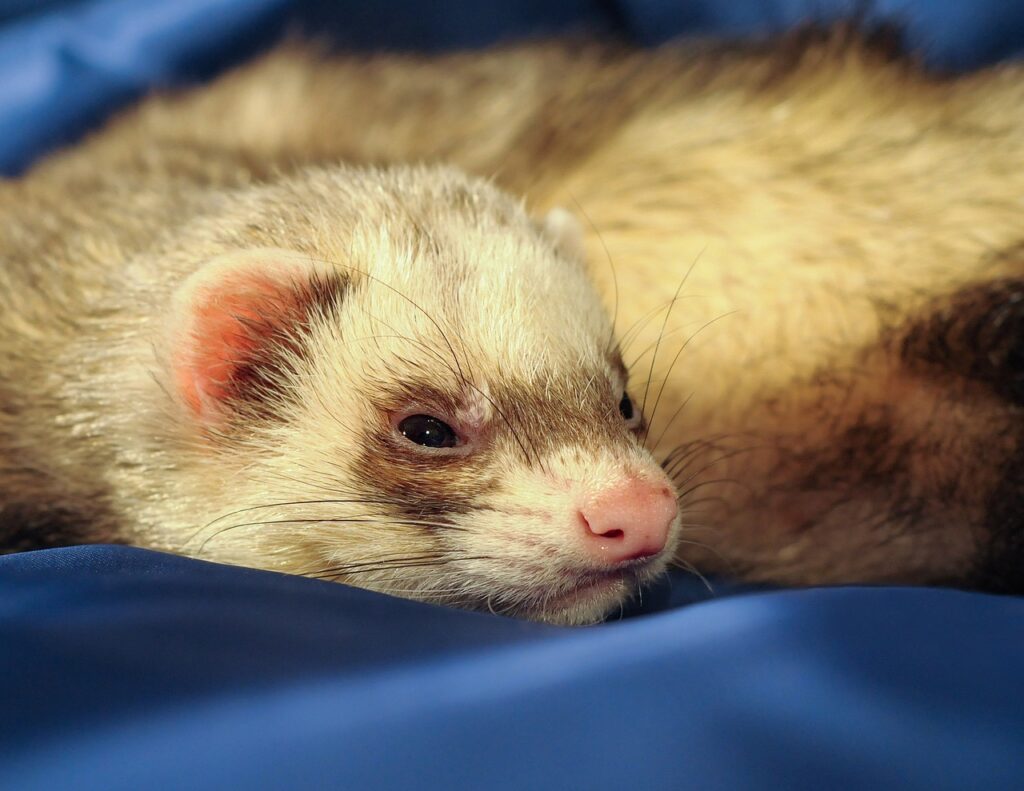Introduction: Ferrets – The Playful Pals
So, you’ve taken the exciting leap to welcome a ferret into your home. High
five! These charismatic, inquisitive little creatures are akin to bundles of
endless energy, always eager to explore and play. Yet, keeping them in the
pink of health, ensuring they’re as sprightly as they look in animated shows,
requires dedication. Allow us to guide you through the maze of ferret health
and wellness.
Understanding Ferret Health Basics
Regular Check-ups
Have you ever put off a doctor’s visit only to regret it later? Ferrets, too,
benefit from timely medical attention. Think of it as taking your car for
regular services; proactive maintenance can prevent major issues down the
road. An annual check-up can keep potential health problems at bay, ensuring
your ferret remains as vibrant as ever.
Dietary Needs
Ponder for a moment on surviving solely on ice cream. Heavenly, no doubt, but
a one-way ticket to health havoc. Similarly, ferrets require a well-rounded
diet. They’re obligate carnivores, meaning meat is their go-to. Incorporate
high-quality, protein-rich food into their diet, steering clear from fillers
like grains or sugary treats.
Clean Living Space
Ever felt agitated in a messy room? Ferrets resonate with that sentiment.
While they may seem carefree, they cherish a clean, organized habitat.
Regularly tidy up their cages, replace bedding, and ensure they have a
contamination-free space to retreat to after their misadventures.
Mental Stimulation
Ever noticed how a child’s eyes light up with a new toy? Ferrets display a
similar zest for novelty. Incorporate toys, puzzles, and playful accessories
to engage their minds. A mentally enriched ferret is a content one,
safeguarded from potential stress or anxiety.
Common Illnesses in Ferrets
Adrenal Gland Disease
Adrenal gland complications are, unfortunately, a recurring theme in ferrets.
These glands, situated above the kidneys, sometimes overproduce certain
hormones, leading to noticeable fur loss, especially around the tail. Staying
vigilant and acting swiftly can pave the path to effective treatments.
Insulinoma
Insulinoma is a silent intruder, manifesting as tumors in the ferret’s
pancreas. These tumors disrupt the insulin balance, causing perilous drops in
blood sugar levels. Symptoms often include lethargy, drooling, or even
seizures. Regular monitoring and prompt medical consultations can be
lifesavers.
Flu & Cold
Imagine the surprise when you find out ferrets, much like us, can fall prey to
the common cold or flu. Watch out for prolonged sneezing, nasal discharge, or
lethargy. While a sneeze or two is no cause for alarm, a pattern can indicate
it’s time for professional medical advice.
Dental Problems
While they might not beam with toothy grins, dental health in ferrets is
pivotal. Tartar build-up, gum diseases, or tooth decay can spell trouble.
Incorporate dental checks in your routine vet visits to ensure their pearly
whites remain in pristine condition.
Preventative Measures: Better Safe Than Sorry!
Vaccinations
Remember those childhood days when a candy bar seemed like a fair trade for
enduring a shot? For your fuzzy friend, the stakes are even higher.
Vaccinations act as a shield against various diseases, ensuring your ferret
can play and explore without undue health risks. Regular shots, complemented
by a treat, can work wonders in safeguarding their well-being.
Regular Exercise
A sedentary lifestyle is a foe, be it humans or ferrets. While you might not
catch your ferret meditating in a lotus pose, they sure do have an innate love
for play. From chasing toys to scampering around rooms, ensure they have ample
opportunities to flex their muscles and expend that boundless energy.
Diet Monitoring
The saying, “You are what you eat”, holds for ferrets as well. Their diet
forms the cornerstone of their health. While commercial ferret foods are
available, it’s vital to ensure they are of premium quality. Avoid fillers or
subpar ingredients. When in doubt, your vet can provide a wealth of guidance
on suitable food choices.
Proper Handling
Ferrets are sturdy and playful but demand gentle care. Think of them as a
delicate piece of art. Each time you pick them up, use both hands, supporting
their body weight. Avoid abrupt movements or tight grips. With love and care,
you’ll earn their trust, and handling them will become second nature.
Spotting the Signs: When to Visit the Vet
Behavioral Changes
Intuition is a powerful tool. If your playful pal suddenly doesn’t seem
itself—maybe it’s more withdrawn, aggressive, or unusually quiet—it’s a cue to
dig deeper. Often, behavioral changes can be the first sign of underlying
health concerns.
Physical Abnormalities
During your cuddle sessions, if you happen to feel any unfamiliar bumps or
notice unusual markings, take heed. Physical changes, be they subtle or
glaring, warrant a closer look, preferably by a professional.
Appetite Changes
One day, your ferret gobbles up its food like there’s no tomorrow, and the
next, it barely nibbles. Fluctuating appetites can be indicators of digestive
issues, dental problems, or even stress. Consistent deviations from their
regular eating habits should prompt a vet visit.
Lethargy
While every creature, ferrets included, cherishes a lazy afternoon now and
then, a persistent lack of energy is concerning. If their usual spunk is
replaced by continuous lethargy, it’s time to seek medical advice.
Conclusion: Ensuring a Healthy, Happy Ferret
Stepping into the world of ferret parenthood is akin to embarking on an
enchanting journey. These lively creatures, with their mischievous antics and
endearing personalities, easily become a beloved part of the family. However,
as with any pet, they come with responsibilities. Their health and well-being
lie squarely in your hands. By maintaining a vigilant eye, seeking timely
medical attention, and ensuring they lead an active, nutritious life, you lay
the foundation for their happiness. With love, care, and the right knowledge,
you’re set to enjoy countless moments of joy with your furry companion. Cheers
to the heartwarming memories awaiting you!
FAQs
- Q: How often should I visit the vet with my ferret?
-
A: It’s a common query among new ferret owners. While annual check-ups are a
standard recommendation, it’s paramount to understand that every ferret is
unique. If you observe any unusual behaviors or signs of distress, don’t
wait for the annual check-up; schedule a vet visit promptly. Regular
monitoring and intuition are invaluable. - Q: What’s a balanced diet for a ferret?
-
A: Ferrets are obligate carnivores, which means their diet should
predominantly consist of meat. A balanced meal for these fuzzballs includes
high-quality ferret food, rich in proteins and fats. Contrary to some
beliefs, fruits and veggies aren’t suitable for them and can lead to
digestive problems. Always consult with your vet before making significant
changes to their diet. - Q: Are ferrets prone to catching human colds?
-
A: Interestingly, yes! Ferrets are susceptible to certain strains of human
influenza viruses. This means if you’re sneezing and coughing, it’s a good
idea to maintain some distance from your ferret to prevent transmission.
Practicing good hygiene, like washing your hands regularly, can also help
protect your pet. - Q: How long can a ferret live?
-
A: A well-cared-for ferret typically lives between 8 to 10 years. However,
their lifespan can vary based on genetics, living conditions, diet, and
overall health. Regular vet visits, a nutritious diet, and ample playtime
can contribute to a longer, healthier life for your ferret. - Q: Do ferrets need any specific toys for mental stimulation?
-
A: Ferrets are curious creatures, and their toys don’t necessarily have to
be store-bought. Tunnel-like toys are a hit, as ferrets love to burrow and
hide. Balls, bells, and soft stuffed toys can also entertain them. Some
owners even craft homemade toys using safe household items. Remember to
periodically check toys for wear and tear to ensure they remain safe for
play.



